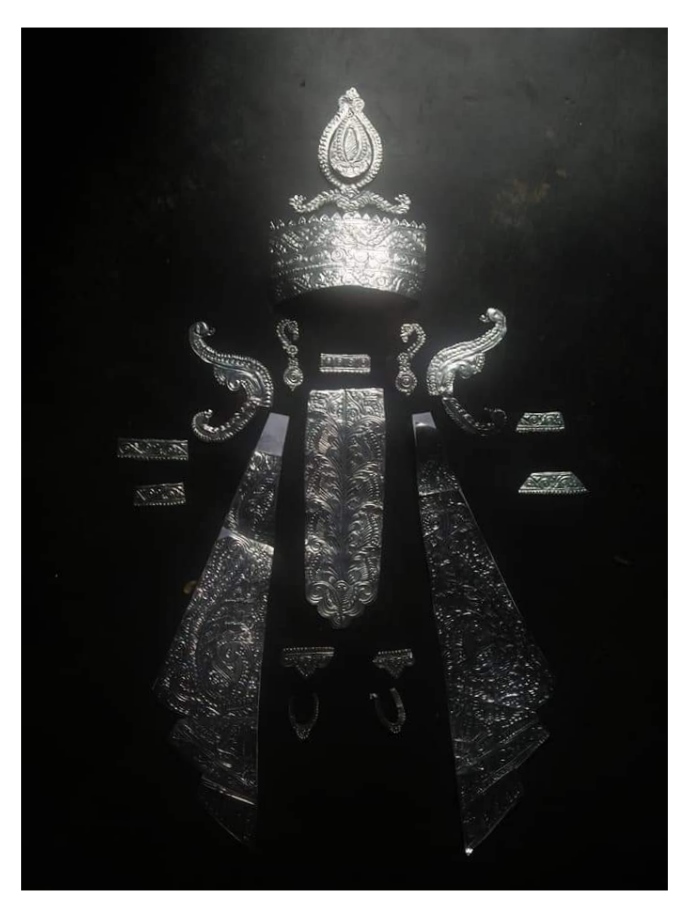It seems, Child, your wish has come true,
For great Maṇikarṇikā has now come to you!
So why does your pain and grief still not burn?
Tell me why you tremble still at death’s churn?
You thought you would come to the glittering ghats: the photographers, the selfies, the tourists, and the hawks. You thought you would come to the Kāśī mahākṣetra, to its grand ambience and to its much-touted cremation grounds. You would sit here for hours over the long night; you would watch the pilings of the wood and the corpses blaze. How fearful surely that would be—yet the patient fire would teach you the transience of the world—or so you hoped. The world passes away—so quietly, so dignifiedly, so sanctified, so acclaimed.
Once you had your fill—having seen it all—you would go home.
It seems, Child, your wish has come true,
For great Maṇikarṇikā has now come to you!
So why does your pain and grief still not burn?
Tell me why you tremble still at death’s churn?
Now the world has begun to burn: the bodies now pile up on the street; your hospitals have become morgues; your crematoriums have melted from the heat; and for lack of oxygen, the pained gasps now become the last. The pyres are everywhere—and their fires refuse to go out. Only now does your mind begin to comprehend Maṇikarṇikā—but there is only repulsion and aversion. Why does your mind now screech in anger, why does your mind now wail in agony, why does your mind howl in rage at apathy and neglect? You have had your fill now—you have seen all you can take—and you can not see anymore. You long to go home now; this has been enough. But this is no tourist-spot, Child.
Maṇikarṇikā is now your home, Child—so where will you run to?
It seems, Child, your wish has come true,
For great Maṇikarṇikā has now come to you!
So why does your pain and grief still not burn?
Tell me why you tremble still at death’s churn?
In all this chaos, now your mind cries out for order. “Surely, this is not the right kind of death. This is not inevitability—this is murder! This was needless death!”
Why were there no oxygen cylinders? Why did you not vaccinate in time? Who prescribed the wrong medication? Who misinterpreted the scans? Who neglected to fill the prescription? What context led to these circumstances? Why are the hospitals ill-equipped? Why was good advice not heeded? Whose hubris turned the world into a slaughterhouse? What greater effort could have prevented this massacre from happening? Whose apathy is to blame for this? Whose ineptitude is to be condemned for this? Why do the killers not hang for this?
Child, you are not looking hard enough—look closely! Your mind once sat at Kāśī’s ghats, watching them pile wood, and set fire to corpses—but you did not really see Maṇikarṇikā. You could accept the death that was daiva, but when it is puruṣakāra, it breaks your heart, and your mind enters into panic. You sit now at this terrifying Maṇikarṇikā and yet your mind still obsesses over the indrajāla of kartṛ, kāraṇa, ceṣṭā, and adhiṣṭhāna. Your mind still despairs over the ‘who’, the ‘why’, and the ‘by whom’. Death has still not shorn the lingering of karma.
Maṇikarṇikā burns incessantly now: bodies turn to ash. When will your karma burn? When will your mind’s duality turn to ash? When will you finally see?
It seems, Child, your wish has come true,
For great Maṇikarṇikā has now come to you!
So why does your pain and grief still not burn?
Tell me why you tremble still at death’s churn?
Go deliver your vaccines, Child, go relieve bodies: go defeat the pandemic, knowing yet that the world can be saved. There is a greater pandemic that rages beneath the visible world: the plague of duality. It looms everywhere, in every heart, in every mind, it haunts the world like an unquiet ghost wreaking havoc: duality is the mind’s poltergeist. It divides the world into the good and the bad, the saintly and the sinful, the just and the unjust, the knower and the known, the intelligent and the foolish. It separates the kartā from the kāraṇa, the kāraṇa from the ceṣṭā, the ceṣṭā from the phala, the phala from the kartā; it separates the jñātā from the jñeya, the striving from the attainment, the desire from the desirable. It turns the good against the bad, the saintly against the sinful, the liberator against the oppressor, the dissident against the repressor. It turns this bhakta against that bhakta, this guru against that guru, this leader from that leader, this follower from that follower, this color from that color, this critic from that critic, this philosophy from that philosophy, this doctrine from that doctrine.
Tell me, Child, what vaccination you have for that plague?
It seems, Child, your wish has come true,
For great Maṇikarṇikā has now come to you!
So why does your pain and grief still not burn?
Tell me why you tremble still at death’s churn?
Heed therefore the wisdom that comes from the siddhas—the liberated ones of yore who danced and sang away—walking on water as if, floating upon the world’s streams. They neither rejoiced in death, nor mourned in life. The currents of the world—of beliefs, of words, of feelings—create shapes and patterns; fooled by its seductions, led by your misdirected striving, do not drown in the depths. Do not be taken in by magic tricks, nor look for the supernatural, or the tall tales of acolytes, nor get addicted to romantic mythologies—all those are for drawing the attention, no more. O Child, longing so pitifully for deliverance from duality, the Guru’s refuge is your only vaccine to all grief. Turn your mind truly towards the Guru: look, look closely! Stop fixating on the visible and the material. For when the Guru’s blessing touches your heart, you are spontaneously freed.
It seems, Child, your wish has come true,
For great Maṇikarṇikā has now come to you!
So why does your pain and grief still not burn?
Tell me why you tremble still at death’s churn?
You think the Guru is one person, existing at one time—and that has become your great noose. All you see is the Guru’s particular body, his particular human countenance, and you think this guru or that guru is really the Guru. So do you not recognize him in other clever disguises! You have heard all of this guru’s words, diligent Child, but now you miss the Guru’s wisdom. You have sought to make the Guru your own, by calling this guru ‘your own’ and that guru ‘not your own’. Now your mind fixates on the materiality of this guru, not knowing the true nature of the Guru. The Guru is everywhere, everyone, but you cannot yet see.
Thinking “Surely, my Guru’s words have more gurutva than yours”, you weigh your guru’s words to find their weight. You measure the letters, the words, the myths, the stories, and you delight in their sweetness—kye ho! “How fantastic are the words of my guru!” But the Guru’s meaning hides behind all this. You have heard all the guru’s words, but you have not really listened to the Guru.
The Guru’s blessing has not yet touched your heart.
It seems, Child, your wish has come true,
For great Maṇikarṇikā has now come to you!
So why does your pain and grief still not burn?
Tell me why you tremble still at death’s churn?
Your mind dwells on the black fumes that dance upon the corpse’s white drape, and your despair clouds your judgment. Stop drawing mothers and fathers out of the vapid shapes, you fool! This black nāyikā, this clever bahurūpī, is a sly bitch. She is the actress in a play, and she plays her part well onstage. She has dressed in beautiful garbs, and her audience has shouted in frenzied excitement, hailing her with high compliments. She has but played a role on the stage: a mere little drama, and already you are captivated? You cannot let her go?! If you meet her on the street, will you greet the actress as her character, or as who she really is? Would you recognize her truly? You still differentiate between mother and murderer, between slayer and slain, between friend and foe—your mind still plays tricks on the nāyikā’s true form.
Snatch away the nāyikā’s sword from her hands, Child, and shred her disguise to pieces. See her for who she really is.
It seems, Child, your wish has come true,
For great Maṇikarṇikā has now come to you!
At the tide of the world’s passing, you weep no more:
For now, there remains no grief, no pain, no sorrow.
For the mumukṣu—
Caitra Śuklā Daśamī,
The 22nd of April in 2021 CE.

